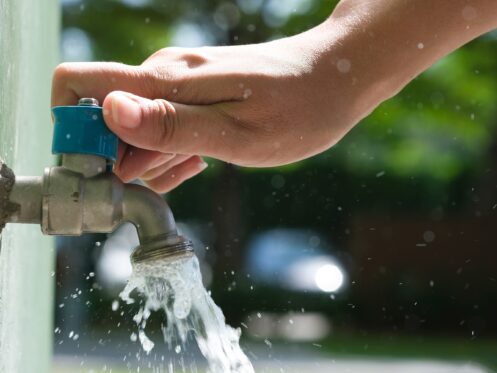When extreme heat settles in, you might think about cranking up the air conditioning and staying hydrated, but what about your plumbing system? High temperatures and dry conditions can strain your pipes, leading to leaks, water pressure changes, and even burst pipes. Your plumbing works harder in the summer, with increased water usage, expanding pipes, and shifting soil all playing a role.
At Delta Mechanical in Mesa, AZ, we’ve seen how intense heat can affect plumbing systems, and we know what it takes to keep yours in top shape. You can protect your home’s pipes from heat-related damage with a bit of awareness and some preventive steps.
How Extreme Heat Causes Pipes to Expand and Crack
When the temperature rises, everything expands, including the pipes in your home. Metal and plastic pipes react to heat by slightly expanding, and while this usually isn’t a problem, repeated expansion and contraction can weaken pipes over time. If your plumbing system has older pipes, small cracks can form, leading to slow leaks that might go unnoticed until they cause real damage.
Outdoor pipes and exposed plumbing are especially vulnerable to heat expansion. If you have an outdoor hose bib or sprinkler system, the pipes connected to them can swell in extreme heat, increasing the risk of leaks or bursts. Indoor pipes aren’t immune, either. If your plumbing runs through attics, crawl spaces, or other areas without temperature control, the heat can put extra stress on them, making leaks more likely.
You might notice warning signs like dripping under sinks, water stains on walls, or an unexplained drop in water pressure. If your home has older plumbing, keeping an eye on potential weak spots can save you from dealing with unexpected leaks. If you notice anything, call for leak detection service to find the problem as soon as possible.
Shifting Soil Can Damage Underground Pipes
When a heat wave hits, the ground around your home changes more than you might think. Extreme heat dries out the soil, causing it to contract and shift. If the ground moves enough, it can strain underground pipes, sometimes causing them to crack or break.
If you’ve ever noticed new cracks in your driveway or foundation during a long dry spell, that same shifting is going on below the surface. Sewer lines, water mains, and irrigation pipes can all be affected by dry, shrinking soil. If a pipe weakens and breaks underground, you might notice puddles forming in your yard, a sudden drop in water pressure, or even an increase in your water bill without a clear reason.
After a long stretch of dry weather, a heavy rainstorm can make things worse. The ground, after being compacted for weeks, suddenly expands when it absorbs water. This rapid change in soil structure can cause underground pipes to shift even more, sometimes leading to unexpected breaks. Keeping an eye on changes in your yard, like soggy patches or unusual plant growth, can help you catch a potential problem before it turns into a major plumbing repair.
Increased Water Usage Puts Extra Strain on Plumbing
Summer heat means using more water. When you’re watering lawns, filling pools, running sprinklers, and taking extra showers, your plumbing system works much harder during the hottest months of the year. If your pipes or water heater are already in questionable shape, the extra demand can push them past their limits.
Older plumbing systems might struggle to keep up with the higher water usage, especially if they already have weak joints or small leaks. You might notice slow drains, fluctuating water pressure, or strange noises coming from your pipes. These are all signs that your system is under stress and might need attention before a bigger issue pops up requiring major plumbing repair service.
Your water heater also takes a hit during extreme heat. While it might not have to work as hard to heat incoming water, it still has to keep up with increased demand. If your water heater is nearing the end of its lifespan, summer might be the season when it starts showing signs of failure. If you’re noticing lukewarm showers or water that runs out faster than usual, it could be time for a checkup.
Higher Temperatures Can Lead to Bacterial Growth in Pipes
During extreme heat, standing water in pipes, especially in unused outdoor faucets, sprinkler lines, or old plumbing, can become a breeding ground for bacteria. If the water sits too long in warm conditions, it can develop an unpleasant smell or taste when it finally comes through the tap.
This is particularly common in homes that rely on well water or have older plumbing systems. If your water has a strange odor, a slight discoloration, or an odd taste, the heat might be playing a role. Sometimes, flushing the system by running the water for a few minutes helps, but in other cases, professional treatment or filtration may be needed.
Even if you don’t notice a change in water quality, keeping pipes clean and water moving through them regularly can help prevent bacterial growth. Running taps that don’t get much use, draining outdoor hoses, and keeping an eye on any unusual changes in the appearance of the water can help keep your system running smoothly.
Extreme Heat Can Weaken Plumbing Fixtures
It’s not just pipes that suffer from heat: Faucets, valves, and hose connections can also take a beating. High temperatures can lead rubber seals and washers to dry out and crack. Once that happens, slow leaks or dripping faucets can follow, adding unnecessary water waste and potential damage.
If you notice an outdoor hose leaking at the connection point, heat damage might be the cause. The rubber gasket inside the fitting can break down over time, making it harder to get a tight seal. Replacing worn-out gaskets and washers is an easy fix, but if ignored, those small leaks can turn into bigger plumbing issues.
Heat can also affect older fixtures inside your home, especially in kitchens and bathrooms with direct sunlight exposure. If a faucet suddenly starts dripping, or a valve doesn’t shut off completely, the seals inside might have dried out from prolonged heat exposure. Catching these small problems early can save you from dealing with a bigger repair later.
Drains and Sewer Lines Clog More Easily
You might not think of summer as a time for drain clogs, but hot weather can make them more common. Grease, soap, and other debris break down differently in warm temperatures. In extreme heat, sticky substances like cooking grease or shampoo residue can become thicker and cling to the sides of pipes, leading to slow drainage or full blockages.
Sewer lines can also struggle in extreme heat. When wastewater sits in hotter pipes, it can dry out certain materials, making it easier for debris to collect and create blockages.
If you notice slow drains, gurgling noises from your pipes, or an occasional sewage smell, your plumbing might be dealing with buildup that needs to be flushed out. If your home has older pipes or tends to experience occasional clogs, running extra water through the system can help keep things moving.
Call Us Today
Extreme heat can put a serious strain on your plumbing system. From expanding pipes to shifting ground, high temperatures can lead to unexpected leaks, pressure problems, and even costly repairs. Fortunately, a little maintenance and early detection go a long way. At Delta Mechanical, we offer comprehensive plumbing services, including leak detection and repair, repiping, drain cleaning, sewer line services, and sump pump repair.
To make sure your plumbing in Mesa is ready to handle the heat, schedule an inspection with Delta Mechanical today.


